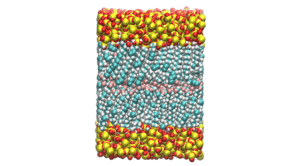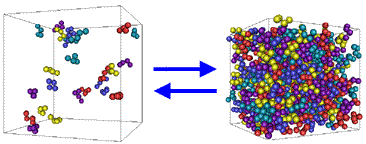Research
The focus of our research is the use of molecular modeling techniques to understand and predict the thermodynamic and transport properties of complex fluids, nanomaterials, and biological systems. These tools include molecular dynamics and Monte Carlo simulations as well as molecular theory.
Current projects include:
Molecular Modeling of Lipid Self-Assembly
Molecular simulation is the ideal tool with which to provide insight into the self-assembly processes of biological systems. In particular we are interested in skin lipids and understanding how and why these molecules assemble into the structures observed through microscopy and biophysical measurements. If we can elucidate the role of normal and abnormal lipid composition on lipid organization and, in turn, on skin barrier function, then we have a molecular basis for breaching the barrier in a controlled manner to deliver drugs more effectively across the skin and for developing treatment strategies to restore barrier function in diseased skin.
Molecular Tribology
We are working to elucidate the molecular phenomena that give rise to macro scale frictional behavior with the goal of improving the tribological properties of coatings used in micro- and nanoelectromechanical systems (MEMS and NEMS). This is motivated by the high cost (over $800B/yr in the US) of friction and wear. Tribology involves molecular mechanisms occurring on a nanometer scale, and hence understanding tribological behavior on this scale is critical to developing new technologies for reducing wear due to friction. Molecular simulation enables the molecular level interactions to be probed providing insight that can be used in the design and optimization of MEMS and NEMS.

MD simulation of two monolayer-coated surfaces shearing against each other
Development and Application of Molecular Theories
The ability to accurately predict the thermodynamic properties of fluids is central to chemical product and process design. Our work focuses on the development of molecular based approaches to determine the thermodynamic properties and phase behavior of fluids, with a focus on the SAFT framework. Our work has application to a wide range of fluids such as hydrocarbons, polymers, ionic liquids and electrolytes.

Snapshot from a GIBBS ensemble simulation of a Lennard-Jones tetramer